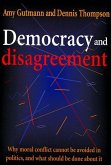Short description/annotation
The authors demonstrate the ubiquitous nature of political disagreement occurring among ordinary citizens.
Main description
Political disagreement is widespread within the communication network of ordinary citizens; furthermore, political diversity within these networks is entirely consistent with a theory of democratic politics built on the importance of individual interdependence. The persistence of political diversity and disagreement does not imply that political interdependence is absent among citizens or that political influence is lacking. The book's analysis makes a number of contributions. The authors demonstrate the ubiquitous nature of political disagreement. They show that communication and influence within dyads is autoregressive - that the consequences of dyadic interactions depend on the distribution of opinions within larger networks of communication. They argue that the autoregressive nature of political influence serves to sustain disagreement within patterns of social interaction, as it restores the broader political relevance of social communication and influence. They eliminate the deterministic implications that have typically been connected to theories of democratic politics based on interdependent citizens.
Table of contents:
1. Communication, influence, and the capacity of citizens to disagree; 2. New information, old information, and persistent disagreement; 3. Dyads, networks, and autoregressive influence; 4. Disagreement, heterogeneity, and the effectiveness of political communication; 5. Disagreement, heterogeneity, and persuasion: how does disagreement survive(?)33;; 6. Agent-based explanations, patterns of communication, and the inevitability of homogeneity; 7. Agent-based explanations, autoregressive influence, and the survival of disagreement; 8. Heterogeneous networks and citizen capacity: disagreement ambivalence, and engagement; 9. Summary, implications, and conclusion.
The authors demonstrate the ubiquitous nature of political disagreement occurring among ordinary citizens.
Main description
Political disagreement is widespread within the communication network of ordinary citizens; furthermore, political diversity within these networks is entirely consistent with a theory of democratic politics built on the importance of individual interdependence. The persistence of political diversity and disagreement does not imply that political interdependence is absent among citizens or that political influence is lacking. The book's analysis makes a number of contributions. The authors demonstrate the ubiquitous nature of political disagreement. They show that communication and influence within dyads is autoregressive - that the consequences of dyadic interactions depend on the distribution of opinions within larger networks of communication. They argue that the autoregressive nature of political influence serves to sustain disagreement within patterns of social interaction, as it restores the broader political relevance of social communication and influence. They eliminate the deterministic implications that have typically been connected to theories of democratic politics based on interdependent citizens.
Table of contents:
1. Communication, influence, and the capacity of citizens to disagree; 2. New information, old information, and persistent disagreement; 3. Dyads, networks, and autoregressive influence; 4. Disagreement, heterogeneity, and the effectiveness of political communication; 5. Disagreement, heterogeneity, and persuasion: how does disagreement survive(?)33;; 6. Agent-based explanations, patterns of communication, and the inevitability of homogeneity; 7. Agent-based explanations, autoregressive influence, and the survival of disagreement; 8. Heterogeneous networks and citizen capacity: disagreement ambivalence, and engagement; 9. Summary, implications, and conclusion.








